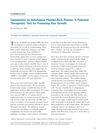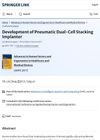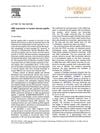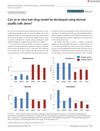 January 2025 in “Current Issues in Molecular Biology”
January 2025 in “Current Issues in Molecular Biology” Certain plant extracts may help prevent hair loss and promote hair growth safely.
 13 citations,
July 2012 in “Dermatologic Surgery”
13 citations,
July 2012 in “Dermatologic Surgery” Platelet-rich plasma (PRP) may help promote hair growth and improve graft survival after hair transplantation, but more research is needed to confirm its effectiveness and determine the best dosage.
 397 citations,
February 2004 in “British Journal of Dermatology”
397 citations,
February 2004 in “British Journal of Dermatology” Minoxidil boosts hair growth by opening potassium channels and increasing cell activity.
 June 2017 in “Advances in intelligent systems and computing”
June 2017 in “Advances in intelligent systems and computing” The new device can implant cell mixtures more effectively for hair loss treatment and is easier for operators to use.
Clitocybin A can promote hair growth by increasing cell proliferation.
7 citations,
August 2020 in “Plastic and reconstructive surgery. Global open” QR 678 and QR 678 Neo are safe and promote hair growth, potentially helping chemotherapy-induced hair loss.
 33 citations,
August 2015 in “F1000Research”
33 citations,
August 2015 in “F1000Research” New model shows muscle affects hair loss differently in men and women.
 51 citations,
July 2013 in “Bioorganic & Medicinal Chemistry Letters”
51 citations,
July 2013 in “Bioorganic & Medicinal Chemistry Letters” Compounds from Polygonum multiflorum root, especially a new one, can boost hair growth more effectively than common treatments.
 2 citations,
June 2016 in “Journal of Applied Biological Chemistry”
2 citations,
June 2016 in “Journal of Applied Biological Chemistry” Glycine soja extract stimulates hair growth and could help treat hair loss.
February 2025 in “Scientific Reports” This study investigates the role of lipids in hair growth, particularly through the HIF-1 signaling pathway. Researchers observed reduced lipid metabolism in the scalp tissues of patients with androgenetic alopecia. Supplementing lipids in culture mediums enhanced hair growth-related gene expression and the proliferation of human dermal papilla cells (DPCs). RNA-sequencing and HIF-1α knockdown experiments identified HIF-1α as a key regulator in lipid-induced upregulation of trichogenic genes. Additionally, in vitro tests with hair follicle organoids showed that lipids promoted the elongation of hair-shaft-like structures. These findings suggest that targeting lipid pathways could be a promising strategy for treating hair loss.
 8 citations,
June 2011 in “Nature Biotechnology”
8 citations,
June 2011 in “Nature Biotechnology” Stem cell treatments can potentially treat baldness, with one trial showing hair growth after injecting a hair-stimulating complex, and no safety issues were reported.
 July 2024 in “Gene & Protein in Disease”
July 2024 in “Gene & Protein in Disease” Exosome therapy shows promise for treating skin conditions and improving wound healing.
June 2024 in “The Journal of Nutritional Biochemistry” 1,25-(OH)2D3 helps hair grow by blocking certain harmful signals.
 88 citations,
February 2011 in “Journal of Dermatological Science”
88 citations,
February 2011 in “Journal of Dermatological Science” Minoxidil helps hair growth by activating the β-catenin pathway.
 16 citations,
January 2016 in “Annals of Dermatology”
16 citations,
January 2016 in “Annals of Dermatology” Green tea component EGCG may help prevent hair loss by changing microRNA levels in certain scalp cells.
 36 citations,
February 2017 in “BMC Complementary and Alternative Medicine”
36 citations,
February 2017 in “BMC Complementary and Alternative Medicine” Geranium sibiricum extract helps hair grow and is more effective than minoxidil but can be toxic in high concentrations.
 7 citations,
July 2005 in “Journal of Dermatological Science”
7 citations,
July 2005 in “Journal of Dermatological Science” The gene URB is more active in human hair growth cells and responds to a hair-related hormone.
 3 citations,
February 2021 in “Experimental dermatology”
3 citations,
February 2021 in “Experimental dermatology” Dermal papilla microtissues could be useful for initial hair growth drug testing.
 September 2019 in “Journal of Investigative Dermatology”
September 2019 in “Journal of Investigative Dermatology” Dermal Papilla Cells grown in 3D and with stem cells better mimic natural hair growth conditions than cells grown in 2D.
 1 citations,
September 2017 in “Journal of Investigative Dermatology”
1 citations,
September 2017 in “Journal of Investigative Dermatology” Blocking a specific enzyme can reduce the negative impact of stress hormones on hair growth cells.
 22 citations,
April 2006 in “Journal of Dermatological Science”
22 citations,
April 2006 in “Journal of Dermatological Science” Vitamin C derivative increases versican in cells, potentially aiding hair growth.
August 2024 in “Food Bioscience” Bifidobacterium longum BB536 metabolites may help treat hair loss by repairing and promoting hair cell growth.
48 citations,
April 1995 in “PubMed” Testosterone helps beard and axillary hair cells grow by releasing growth factors from dermal papilla cells.
Biomimetic dermal papilla spheres can help regenerate hair to some extent.
 1 citations,
August 2023 in “bioRxiv (Cold Spring Harbor Laboratory)”
1 citations,
August 2023 in “bioRxiv (Cold Spring Harbor Laboratory)” Certain cells in the adult mouse ear come from cranial neural crest cells, but muscle and hair cells do not.
 12 citations,
September 2020 in “Stem cell research & therapy”
12 citations,
September 2020 in “Stem cell research & therapy” Adult skin cell-based early-stage skin substitutes improve wound healing and hair growth in mice.
 77 citations,
March 2014 in “Cold Spring Harbor Perspectives in Medicine”
77 citations,
March 2014 in “Cold Spring Harbor Perspectives in Medicine” Fat cells are important for healthy skin, hair growth, and healing, and changes in these cells can affect skin conditions and aging.
6 citations,
August 2015 in “Acta histochemica” Lysozyme might help mouse hair grow.
 19 citations,
January 2017 in “Stem Cells International”
19 citations,
January 2017 in “Stem Cells International” Adipose-derived stem cells show promise in treating skin conditions like vitiligo, alopecia, and nonhealing wounds.
 7 citations,
January 2019 in “Pharmaceutical Biology”
7 citations,
January 2019 in “Pharmaceutical Biology” Eclipta prostrata helps hair growth and maintains the growth phase by affecting certain growth factors.






















